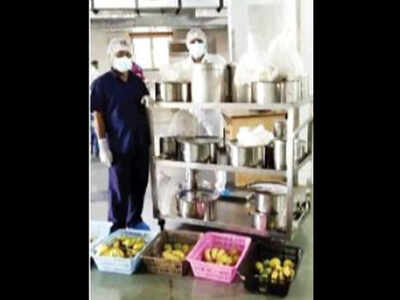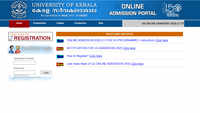
MARGAO: Dal fry, chana masala and cabbage bhaji with a bowl of rice/roti, supplemented by a medium-sized banana and a boiled egg. As the culinary fare appears nutritious yet appealing enough, things seem to be looking up for the patients at the ESI-Covid hospital in Margao, at least on the food front. The thali was served to the 120-odd Covid-19 patients on Thursday for lunch.
“The menu has been planned considering requisite high protein diet for Covid-19 patients and has a balanced proportion of carbohydrates, proteins and fats supplying approximately 1,000cal and 30gm protein, besides dietary vitamins and minerals. All standard hygiene protocols are strictly followed while preparing the food,” the dietician at the hospital noted in her record sheet.
As per the new standard operating procedure (SOP) put in place for preparing and serving food for Covid patients, the daily menu needs to be approved by the South Goa district administration before the food is cooked and served to the patients.
The district administration pulled up its socks and streamlined the process of food management for patients following reports of sub-standard food being served to the patients.
“It’s not that the patients were given poor quality food earlier. It’s just that we are now maintaining the records of the food served that is in accordance with the dietary requirements of Covid patients. We are also ensuring that the patients are served an extra protein-rich diet,” Prasanna Acharya, in-charge of the ESI-Covid hospital representing the South Goa district administration, told TOI.
The lunch and dinner are prepared in the ESI kitchen under strict hygienic conditions and under the supervision of the ESI hospital’s dietician. However, the culinary services hardly earn any appreciation from the patients, largely as they are symptomatic Covid patients, who have lost their sense of taste and smell — typical Covid-19 symptoms — and thus find the food bland and unpalatable.
Sources said that following a recent crisis after the several members of the ESI kitchen staff tested positive for Covid-19, catering of all three meals were outsourced. The ESI has now restored its kitchen services, though the breakfast for patients still remains outsourced. The serving plates and utensils are sterilized after every use.
Nevertheless, maintaining the hospital’s wash rooms still remains a challenging task for the hospital’s multi-tasking staff. Sources said that as most of the patients admitted in the hospital are residents of slums, some aren’t toilet trained and thus leave the wash rooms in a mess.
“It’s gut wrenching to observe chappal marks atop the toilet bowl, thereby indicating that the earlier user had climbed on it. There are other unspeakable ways the toilet bowls are put to use by some patients who apparently had never used toilets before,” a health care worker in the hospital told TOI. “And you can’t toilet-train them at a time when they are facing a health crisis.”
Despite all odds and constraints, sources in the ESI said, the multi-tasking staff engaged in maintaining the toilets are doing a “wonderful job.” “The staff is stretched to the limit,” a hospital source said. “They have been working without any break for the last 3-4 months. The resources too are over stretched. The hospital was earlier catering to a limited number of ESI patients and was under utilised. The staff and resources are now catering to twice or thrice its earlier capacity.”
“The menu has been planned considering requisite high protein diet for Covid-19 patients and has a balanced proportion of carbohydrates, proteins and fats supplying approximately 1,000cal and 30gm protein, besides dietary vitamins and minerals. All standard hygiene protocols are strictly followed while preparing the food,” the dietician at the hospital noted in her record sheet.
As per the new standard operating procedure (SOP) put in place for preparing and serving food for Covid patients, the daily menu needs to be approved by the South Goa district administration before the food is cooked and served to the patients.
The district administration pulled up its socks and streamlined the process of food management for patients following reports of sub-standard food being served to the patients.
“It’s not that the patients were given poor quality food earlier. It’s just that we are now maintaining the records of the food served that is in accordance with the dietary requirements of Covid patients. We are also ensuring that the patients are served an extra protein-rich diet,” Prasanna Acharya, in-charge of the ESI-Covid hospital representing the South Goa district administration, told TOI.
The lunch and dinner are prepared in the ESI kitchen under strict hygienic conditions and under the supervision of the ESI hospital’s dietician. However, the culinary services hardly earn any appreciation from the patients, largely as they are symptomatic Covid patients, who have lost their sense of taste and smell — typical Covid-19 symptoms — and thus find the food bland and unpalatable.
Sources said that following a recent crisis after the several members of the ESI kitchen staff tested positive for Covid-19, catering of all three meals were outsourced. The ESI has now restored its kitchen services, though the breakfast for patients still remains outsourced. The serving plates and utensils are sterilized after every use.
Nevertheless, maintaining the hospital’s wash rooms still remains a challenging task for the hospital’s multi-tasking staff. Sources said that as most of the patients admitted in the hospital are residents of slums, some aren’t toilet trained and thus leave the wash rooms in a mess.
“It’s gut wrenching to observe chappal marks atop the toilet bowl, thereby indicating that the earlier user had climbed on it. There are other unspeakable ways the toilet bowls are put to use by some patients who apparently had never used toilets before,” a health care worker in the hospital told TOI. “And you can’t toilet-train them at a time when they are facing a health crisis.”
Despite all odds and constraints, sources in the ESI said, the multi-tasking staff engaged in maintaining the toilets are doing a “wonderful job.” “The staff is stretched to the limit,” a hospital source said. “They have been working without any break for the last 3-4 months. The resources too are over stretched. The hospital was earlier catering to a limited number of ESI patients and was under utilised. The staff and resources are now catering to twice or thrice its earlier capacity.”
Quick Links
Kerala Coronavirus Helpline NumberHaryana Coronavirus Helpline NumberUP Coronavirus Helpline NumberBareilly NewsBhopal NewsCoronavirus in DelhiCoronavirus in HyderabadCoronavirus in IndiaCoronavirus symptomsCoronavirusRajasthan Coronavirus Helpline NumberAditya ThackerayShiv SenaFire in MumbaiAP Coronavirus Helpline NumberArvind KejriwalJammu Kashmir Coronavirus Helpline NumberSrinagar encounter
Get the app








